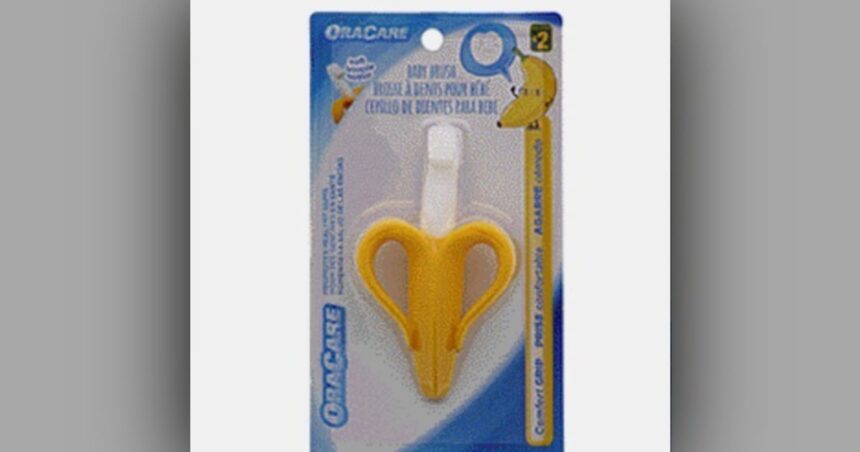The morning text arrived as I was boarding a ferry to Bowen Island. My friend, a new mom, was frantic: “Do you know about the Dollarama toothbrush recall? The one we bought for Emma last week?“
I didn’t, but within minutes found myself scrolling through Health Canada’s recall notices while the ferry cut through the misty waters of Howe Sound. The Oracare Baby Brush & Toothbrush, a seemingly innocuous item sold at Dollarama stores nationwide, had just been pulled from shelves after reports that its bristles could detach and become a choking hazard for infants.
For the nearly 100,000 Canadian families who purchased this product between January 2023 and June 2024, the recall notice landed with particular weight. These $1.50 toothbrushes represented both the economic reality many parents face and the implicit trust we place in regulatory systems to protect our most vulnerable.
“I bought it because it was affordable,” explains Melissa Chen, a mother of twins I spoke with outside a Vancouver Dollarama. “You trust that if something’s being sold in Canada, especially for babies, it’s been tested properly.”
The recall notice, issued June 14th by Health Canada in coordination with Dollarama, describes the specific safety concern in clinical terms: “The bristles may detach from the brush during use, posing a choking hazard.” But behind this bureaucratic language lies a deeper story about product safety, economic access, and the particular vulnerability of children.
According to Health Canada’s consumer product safety database, approximately 93,000 units of these blue and pink infant toothbrushes were sold across Canada. The products, manufactured in China and distributed by Dollarama, were specifically marketed for babies’ developing teeth and gums.
Dr. Emily Wong, a pediatric dentist with a practice in East Vancouver, explains why this particular recall concerns her. “Infant oral care products need to undergo rigorous safety testing. A detaching bristle is especially dangerous because babies naturally use their mouths to explore objects, and their gag reflexes aren’t fully developed.”
While Health Canada reports no injuries in Canada so far, the potential consequences of a bristle becoming lodged in a child’s airway are severe. Choking remains among the leading causes of injury and death in young children, according to the Canadian Paediatric Society.
What makes this recall particularly noteworthy is how it intersects with economic reality for many Canadian families. Dollar stores have become essential retailers for many households struggling with Canada’s rising cost of living. Statistics Canada data shows that in the past year, the cost of raising children has increased by nearly 6%, with baby products seeing some of the steepest price increases.
“When you’re trying to stretch every dollar, you rely on regulatory systems to ensure even low-cost items meet basic safety standards,” says Alex Morrissette, policy analyst with the Consumers Council of Canada. “There shouldn’t be a safety gap between what wealthy and low-income families can afford.”
Dollarama has issued statements indicating they are cooperating fully with Health Canada and urging consumers to immediately stop using the product. Customers can return the toothbrushes to any Dollarama location for a full refund, no receipt required.
The recall process itself reveals both strengths and weaknesses in Canada’s consumer protection framework. While Health Canada maintains a robust recall system, the effectiveness of these notices relies heavily on consumer awareness. A 2022 study by the University of British Columbia found that recall notices reach only about 60% of affected consumers, with lower-income households less likely to learn about recalls.
Walking through Vancouver’s Hastings-Sunrise neighborhood yesterday, I stopped by three Dollarama locations. Two had prominent notices about the recall posted at checkout counters, while one had no visible information. When asked, a staff member at the third location was aware of the recall but mentioned they hadn’t received official signage yet.
For parents like Jasmine Torres, whom I met at a community playground with her 8-month-old, the recall process itself can be intimidating. “English isn’t my first language, and I’m not always checking these government websites,” she told me while supervising her daughter on the swings. “Sometimes I worry about what I might be missing.”
Torres raises an important point about accessibility. Health Canada publishes recall information in both official languages, but for the nearly 22% of Canadians who speak neither English nor French as their first language, these critical safety notices can slip through the cracks.
Some community health centers are working to bridge this gap. At the Reach Community Health Centre in East Vancouver, staff have begun including recall information in their regular communication with new parents.
“We’re trying to make sure these notices reach everyone, regardless of language barriers or digital access,” explains Nurjehan Ahmed, a community health worker at Reach. “Something as simple as a toothbrush shouldn’t put a child at risk because a family missed a recall notice.”
The Oracare recall also highlights the global nature of product manufacturing and the challenges of maintaining consistent safety standards. The toothbrushes were manufactured in China, imported by a Canadian retailer, and subject to Canadian safety regulations – a common supply chain for consumer goods.
Dr. Wong points out that this isn’t just a dollar store issue. “We’ve seen recalls from expensive brands too. The difference is often in how quickly problems are identified and how companies respond.“
For parents wondering about alternatives, Dr. Wong recommends silicone finger brushes for infants or soft-bristled brushes specifically designed for babies from reputable manufacturers who specialize in children’s products. “And always supervise oral care for children under three,” she adds.
As I headed back on the afternoon ferry, I texted my friend an update with Health Canada’s link and Dollarama’s refund policy. Her relief was palpable even through text: “Thanks for checking. Bringing it back today.”
This recall, like many others, will likely fade from public awareness in coming weeks. But for the safety advocates, regulators, parents, and health professionals navigating these waters, each recall represents both a system that caught a potential danger and one that allowed it to reach store shelves in the first place.
In the meantime, 93,000 little blue and pink toothbrushes will make their way back to Dollarama stores across Canada – small reminders of the invisible safety infrastructure we rely on every day, and what happens when it falters.






